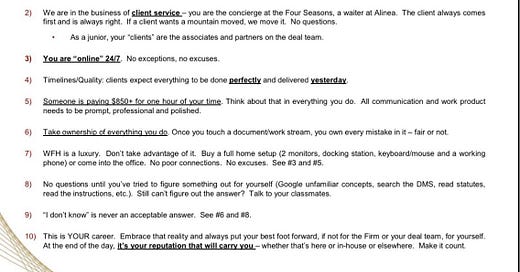Saying the quiet part loud
A rogue associate at a huge law firm shows why law firms are behind the times
The above is a snippet from an internal presentation given by an associate to other, younger associates at Paul Hastings about what it means to be an associate at an elite law firm.
These firms have high expectations because the clients have high expectations, but following the “non-negotiables” listed above don’t make you a good lawyer. It would just make you a highly paid gofer.
Let’s take a closer look:
Availability: Firm culture glorifies being “always on,” but the truth is, nobody is available 24/7, nor should they be. Even the most elite athletes have an offseason, a time to rest, recharge, and recuperate. Studies have shown that sleeping less than five hours per night can increase your mortality risk by as much as 15%. If the job requirement is that an associate be available 24/7, then you are sending the message that “you can’t work here and expect to have a personal life or be a parent or a caregiver.” With that kind of attitude pervading firm culture, it’s no wonder that gender parity at law firms has been so elusive. Ask yourself, would a client want an inaccurate, shoddy response at 2am or a coherent solution at 9am?
The client is always right: This is a dangerous mindset that will stifle creativity and lead to mediocre results. Companies hire outside counsel for our expertise and resources. Not to be a parrot. If the client knew exactly how to do what they’re asking us for, then they wouldn’t need us in the first place. Our job is to bring our expertise and experience to bear and fashion new solutions. Do it how it’s always been done at your own peril.
“I don’t know” is unacceptable: This is tricky. Of course, associates are expected to be resourceful and diligent in finding answers and completing tasks. But we need to acknowledge that one person could never know everything. The ability to collaborate and leverage the expertise of others is one of the main reasons law firms exist. The client does not want to pay for a junior associate who spent 10 hours on a task that more experienced attorneys in that same firm could have completed in 30 minutes. That’s a waste of client resources. Encourage resourcefulness, but don’t deter associates from seeking guidance.
Paul Hastings has already distanced itself from this PowerPoint, which was prepared by a rogue associate (link below). Good on PH for doing that, because can you imagine their lawyers going to recruit at any law school and the first question from students being “do we really have to be online 24/7?”



